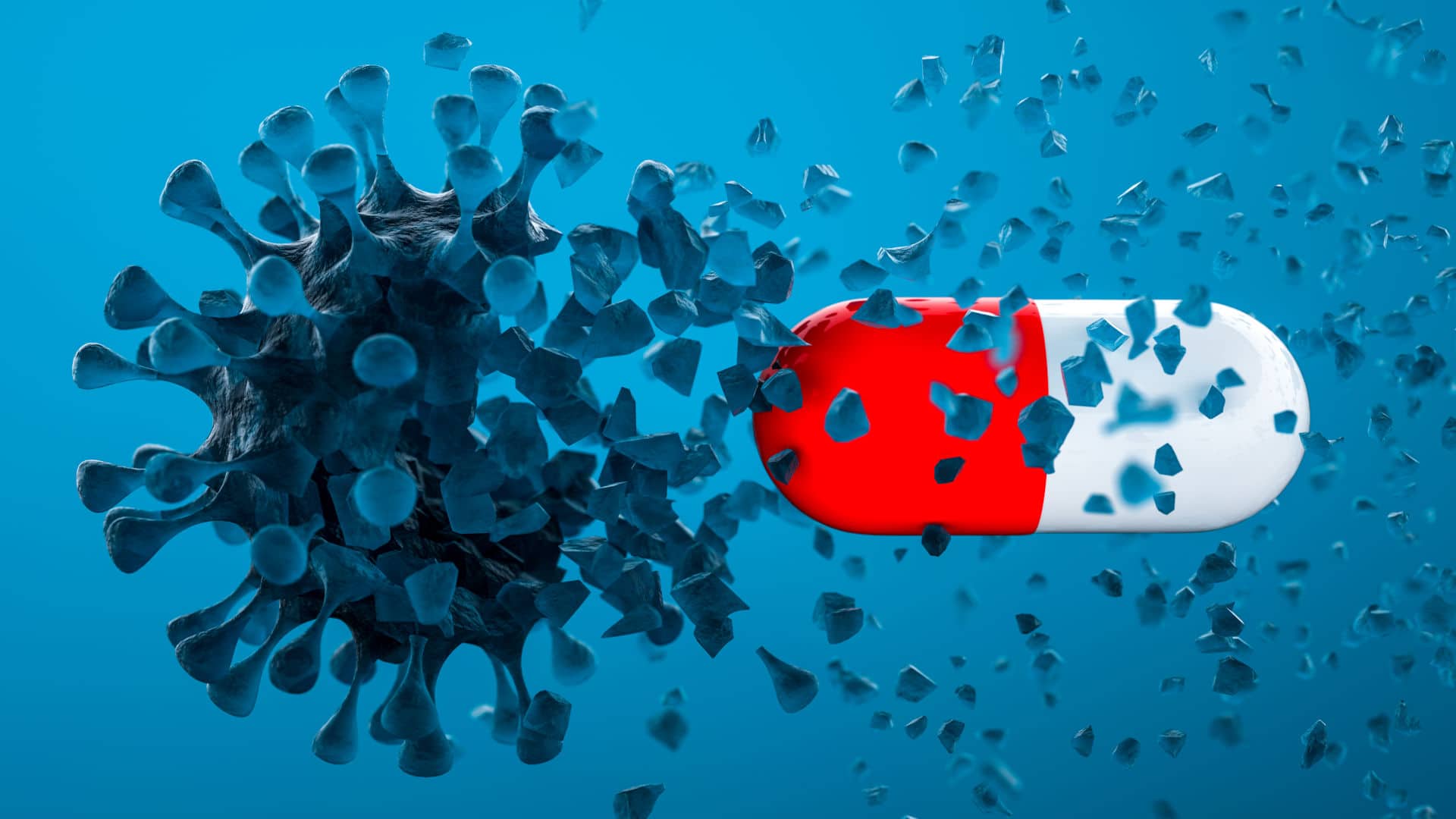On Monday, the drugmaker Merck and a partner, Ridgeback Biotherapeutics, announced they were seeking emergency authorization from the Food and Drug Administration for a new Covid-19 drug.
If authorized, the drug, molnupiravir, would be the first antiviral pill to treat Covid-19. Earlier this month, the companies released trial data for 762 high-risk Covid-19 patients who had received molnupirarvir — or a placebo — while only exhibiting mild-to-moderate symptoms. According to a Merck press release, molnupiravir “reduced the risk of hospitalization or death by approximately 50 percent.” (The full data has not yet been published or peer reviewed.)
The drug “would allow us to treat many more people much more quickly and, we trust, much less expensively,” William Schaffner, a Vanderbilt University infectious disease specialist who was not involved in the trial research, told The Associated Press earlier this month.
The development of effective antiviral drugs is a difficult — and long neglected — area of research. The only approved antiviral for Covid-19 in the United States, remdesivir, must be administered intravenously, and its performance has been lackluster.
There’s widespread agreement that, for most people, vaccination is the best protection against a severe case of Covid-19. But the Merck announcement comes amid a wave of interest in Covid-19 therapeutics — a category that includes antiviral drugs as well as immune proteins that help attack viruses, called monoclonal antibodies.
The reasons for that interest vary. Some of it is rooted in skepticism: Many vaccine deniers have flocked toward therapies — including unproven treatments like the deworming drug ivermectin — to fight the virus, instead of taking advantage of the safe, effective shots.
Other people are invested in therapeutics because they are immunocompromised and may not develop a strong immune response after receiving Covid-19 vaccines. Last week, the drugmaker AstraZeneca asked the FDA to issue an Emergency Use Authorization for its antibody cocktail as a Covid-19 prophylactic — to be given to immunocompromised people in order to lower their risk of contracting a symptomatic case.
In theory, with billions of people still waiting to receive a Covid-19 vaccine, a relatively inexpensive antiviral like molnupiravir could also help address outbreaks in poor countries. But wealthier countries are already scrambling to secure doses, and whether the drug would be widely available and helpful in other parts of the world is not yet clear.
For Merck, a leading vaccine-maker that failed to bring a Covid-19 vaccine to market, a Covid-19 drug may offer some vindication — and massive profits. It could also bring new attention to less savory practices in the pharmaceutical industry. Molnupiravir was first developed at Emory University, with $16 million of government funding. But in March 2020, as Science and The Washington Post reported last year, the university sold the drug for an undisclosed amount to a tiny pharmaceutical company, Ridgeback — which then sold the drug to Merck two months later, in an arrangement some experts compared to flipping a house.
Still, many experts are hopeful that molnupiravir will be a helpful new tool for curbing the pandemic. And the drug may soon have company: Other drugmakers, including Pfizer, have their own Covid-19 antiviral drugs now in trials.
Also in the News:
• Just two weeks ahead of the 26th United Nations Climate Change conference, a new report from the international partnership Climate Transparency offers a grim assessment of the world’s progress toward meeting carbon emissions targets. The report projects that the G20 — a group of 20 global economic powers that includes the U.S., China, and the European Union — is poised to see its collective carbon dioxide emissions climb by 4 percent this year, rebounding from a pandemic-driven decline in 2020. The report attributes the rise largely to resurging economies and increased production of coal and other fossil fuels. It also finds what it calls a significant “ambition gap” between the emissions targets G20 countries have set for themselves and the carbon levels that will be needed to limit global warming to 1.5 degrees, a key threshold for averting the worst impacts of climate change. Among the report’s few bright spots, newly installed wind power capacity in G20 countries nearly doubled between 2019 and 2020, and the share of energy from renewable sources ticked up in 2021. The report also affirmed that carbon emissions in the U.S. have generally trended downward in recent years, but it noted that, per capita, they remain more than twice the G20 average. (BBC)
• On Monday, Texas Gov. Greg Abbott issued an executive order forbidding anyone in the state, including private businesses based there, from mandating Covid-19 vaccines. The move comes amid growing GOP political resistance to such mandates, including President Biden’s decision last month to require federal employees and companies with more than 100 employees to institute such protective measures or require regular Covid-19 testing. Earlier this month, Arkansas legislators drafted a new bill creating mandate exemptions. In Texas, three major businesses with a large presence in the state — Southwest Airlines, American Airlines, and IBM — have already announced they plan to continue to require that employees to be vaccinated. “We believe the federal vaccine mandate supersedes any conflicting state laws,” American Airlines said in a statement. But the increased pushback also raised new fears that the hostility over Covid-19 vaccines could expand into a broader rejection of vaccination and vaccine mandates, which have a long history in the U.S. In an interview with The Washington Post, Ashish Jha, dean of the school of public health at Brown University, pointed out that many of the health gains of the 20th century derived from vaccines. Turning away from vaccination, he said, “would cause a lot of unnecessary suffering and death, particularly among children.” (Multiple Sources)
• Earlier this week, the U.S. Preventive Services Task Force, an independent panel of health experts convened with the support of Congress, issued updated guidance that high-risk adults should not take a daily low dose of aspirin to prevent first heart attacks or strokes without consulting their doctors. Aspirin thins the blood, and in 2016 the panel suggested it could help prevent hearts attacks or strokes in at-risk older adults. But the drug can also increase the risk of dangerous bleeding, especially in the gastrointestinal tract. According to the newly updated guidance, the risk of bleeding outweighs any potential gains for people in their 60s. The benefits are unclear for people in their 50s, the new guidance says, and there may be a slight benefit for people in their 40s. John Wong, an internist at Tufts Medical Center and a member of the task force, told The Associated Press that, regardless of their age, adults should consult their doctors about stopping or continuing aspirin doses. The previous guidance also mentioned that aspirin could provide protection against colorectal cancer, but the updated guidance says that more evidence is required to understand the potential effect. The panel has made the guidance available for public comments until Nov. 8, after which they plan to make a final decision. (The Associated Press)
• And finally: On Wednesday the World Health Organization (WHO), announced that a group of 26 scientists, each hailing from a different country, will investigate the origins of the coronavirus responsible for the Covid-19 pandemic. The proposed group, dubbed the Scientific Advisory Group for the Origins of Novel Pathogens (SAGO), will also develop a framework for studying the emergence of other dangerous pathogens. The head of the WHO’s emerging disease and zoonosis unit, Maria Van Kerkhove, expressed optimism that SAGO could provide a clearer picture of the novel coronavirus’s potential origin, free of the contentious international politics that have surrounded the issue. China’s government maintains that the idea of a potential lab leak from the Wuhan Institute of Virology is scientifically unsubstantiated, and while debate continues elsewhere among experts, U.S. officials, WHO leaders, and many infectious disease experts from around the globe continue to think a lab leak is a possibility. Although the proposed WHO group includes one Chinese scientist, SAGO cannot compel China to permit an on-the-ground investigation. The WHO will allow two weeks of public comment before formally appointing the proposed candidates. (The Washington Post)
“Also in the News” items are compiled and written by Undark staff. Deborah Blum, Lucas Haugen, Sudhi Oberoi, and Ashley Smart contributed to this roundup.










